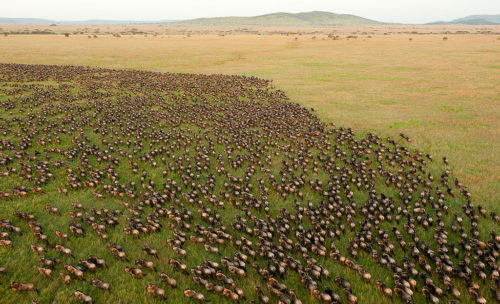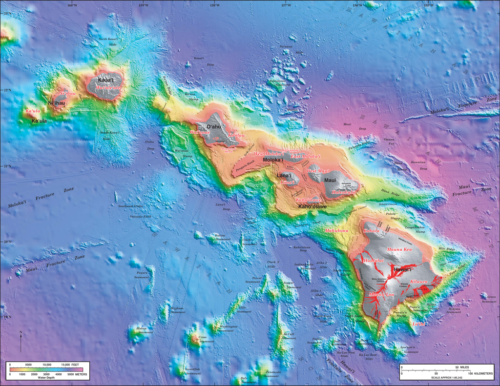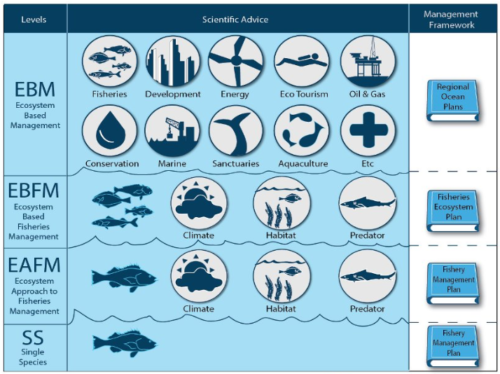Who lives in a pineapple under the sea?
Kayle Krieg ·By: Kayle Krieg
Sandra “Sandy” Cheeks is a scientist and inventor who is working on a research project funded by Texas (as explained in Episode 70a: Chimps Ahoy). For those of you who have never seen Spongebob Squarepants, Sandy Cheeks is a squirrel that is living underwater in Bikini Bottom alongside various marine creatures, including the series namesake, Spongebob, and his best friend (forever) Patrick Star. Sandy lives in an airtight tree dome and interacts with the residents of the underwater community while wearing an astronaut suit. As a scientist and inventor, she does experiments in her underwater laboratory that pertain to various fields, and even buckles under the pressure of having her funders come visit her (very relatable). As I have watched countless episodes of this show with my children, and have even gone on various marine biology-related rants (e.g. nematodes do NOT have segments), I have formed a new theory: Perhaps Sandy Cheeks is not present in Bikini Bottom to do physical science experiments and create inventions. Instead, perhaps she is an ethnographer in the middle of a long-term study to understand the culture of Bikini Bottom. I hope she has all of her IRB paperwork in place.

This week in our MEES Environment and Society class, we discussed ethnographic approaches and knowledge integration. Ethnography is the study of people in their environments. A researcher using this approach immerses themselves in another culture and, through observation and interviews (semi-structured, informal or otherwise), they begin to learn about the culture. It takes time to gain trust and permission from the community, and even longer to learn cultural norms. Our class had a lot of questions regarding the methodologies of ethnography. How do researchers overcome observer biases? How do you respectfully gain permission to do research from leaders of communities? How do you approach marginalized communities and those that are underrepresented in ecological debates? When dealing with communities associated with historical trauma, how do you ensure that you cause no harm? We had three researchers present to give their insights on how to address biases and respect other cultures:
guest lecturer Dr. Jen Shaffer, as well as Dr. Michael Paolisso andDr. Liz Van Dolah. Their different backgrounds provided a well-rounded information session.
Our first reading was the article “Tracking wildebeest, locating knowledge: Massai and conservation biology understandings of wildebeest behavior in Northern Tanzania,” by Mara Goldman.1 The indigenous Maasai have historical knowledge of wildebeest movements and can use this knowledge to observe environmental conditions to predict where wildebeest will be. Scientists use counting methods such as aerial surveys to count wildebeest populations. In this paper, the author argues that the focus of reconciling traditional ecological knowledge, such as that of the Maasai, with science should focus on building dialogues rather than integrating, or “building bridges”. The latter, she states, implies a hierarchy of these knowledge spaces, as one would be integrated INTO the other. Her point was that both stakeholders should be active in conservation decision making. I thought this focus not on integration, but inclusion, was an interesting way to approach this reconciliation of knowledge systems.

Forced assimilation of Native Americans was detrimental and destructive to cultural traditions, spirituality, and languages. Integrating traditional ecological knowledge into western science is sometimes feared because of these same reasons. Indigenous people do not want to lose their knowledge. Proper attribution and respect of knowledge is a subject of deep concern for some indigenous scientists, and rightly so. The track record for colonizers using indigenous resources and dismissing indigenous presence is not a good one.2

The second reading we discussed was called “Linking Land and Sea through Collaborative Reserch to Inform Contemporary applications of Traditional Resource Management in Hawai’i,” by Delevaux et al.3 The authors describe a modeling framework linking land and sea through groundwater, and indicator communities of benthic and fish species under multiple scenarios. Informed by local ecological knowledge, these place-based models gave the best overall picture of the specific needs of each system. The resulting Impact Assessment showed that Ka’upulehu is more vulnerable to local land use change and climate change, while windward side reefs were exposed to higher rainfall and wave power. Reactions to this paper were broad in the class discussions, ranging from thinking the model was a decent combination of knowledge systems, to thinking that the local ecological knowledge was not considered enough in the framework design.

Some consider traditional ecological knowledge and western science to be two sides of the same coin. Methodologies are different, particularly in recording and sharing data and in data generation, but sometimes the questions are the same. How does the world “work”? Recently, science has been moving from more reductionist approaches towards more holistic approaches, which sometimes take into account traditional ecological knowledge. The National Oceanic and Atmospheric Administration (NOAA) for example has moved to ecosystem based fisheries management approaches (EBFM)4 to better inform management decisions. While scientists create time series data at study sites over years, indigenous people have been making iterative observations over many generations that often are written off as “anecdotal”. In reality, these observations are valuable data that could be used to better inform resource managers. That is, however, if the traditional ecological knowledge holders choose to share their knowledge. As useful as this knowledge could be to scientists, no one is entitled to another’s knowledge.

A few weeks ago we discussed a transdisciplinary approach as described in this blog. Transdisciplinary research is a collaborative effort between scientists and communities. Is the reconciliation of traditional ecological knowledge and mainstream science a starting point for transdisciplinary science? Perhaps incorporating multiple knowledge systems can be the main ingredients of chicken soup for the transdisciplinary soul.
References:
1. Goldman, M. 2007. Tracking wildebeest, locating knowledge: Maasai and conservation biology understandings of wildebeest behavior in Northern Tanzania. Environment and Planning 25:307-331
2. Veitayaki, J. (2002). Taking advantage of indigenous knowledge: the Fiji case. International Social Science Journal, 54(173), 395-402.
3. Delevaux, J., et al. 2018. Linking Land and Sea through Collaborative Research to Inform Contemporary applications of Traditions Resource Management in Hawai’i. Sustainability. 10:3147
4. National Oceanic and Atmospheric Administration. Understanding the Levels of Ecosystem-Based Management in Relation to Marine Fisheries Management.
Next Post > Making connections to ensure a clean and healthy Chesapeake Bay
Comments
-
Isabel Sullivan 6 years ago
I LOVED the idea of Sandy being an ethnographer! This example was very well weaved in with our class discussion on how ethnographers study communities!
-
HAMANI WILSON 6 years ago
I think your historical context of the past that has lead to distrust by indigenous communities is very important. The fact of the matter is, our ability to study people or culture is a privilege. You summarized that perfectly here "As useful as this knowledge could be to scientists, no one is entitled to another’s knowledge.". Well Done
-
Michael J. Paolisso 6 years ago
I think I will start watching Spongbob Squarepants to sharpen my ethnographic skills. I do appreciate you were able to transfer what was talked about in class to something very different in your life, including watching it with your children. I think that is a good way to make what we learn personable and long lasting. Thanks.
-
Taylor Gedeon 6 years ago
Oh my GOD. Sandy Cheeks, the ethnographer!! What a great idea. I would read any papers she published in a heartbeat. Great blog!
-
Alison Thieme 6 years ago
Entertaining read, Kayle. I really liked the recognition of the importance of indigenous knowledge but also the right to autonomy in sharing that knowledge.
-
Megan Munkacsy 6 years ago
As a Spongebob Stan, I was very excited about this blog.
The single citation after the statement about the history of colonization made me snort in an ironic, dark sense. You did a great job bringing last weeks conversation out of the classroom.
-
Andrea Maria Miralles-Barboza 6 years ago
"Is the reconciliation of traditional ecological knowledge and mainstream science a starting point for transdisciplinary science?" thats what I was thinking as well as we did these readings.
-
Faith T 6 years ago
I also hope Sandy has her IRB in order! What university is she associated with?
-
Amanda Rockler 6 years ago
I need to watch Sponge Bob! Such a fun and well written synopsis of class. Images were great and I appreciated the conversation around TEK and more traditional science.
-
Enid Munoz Ruiz 6 years ago
I'm mind-blown by the Sandy Cheeks as an ethnographer theory. Very creative!
Excellent job consolidating the class discussion.

